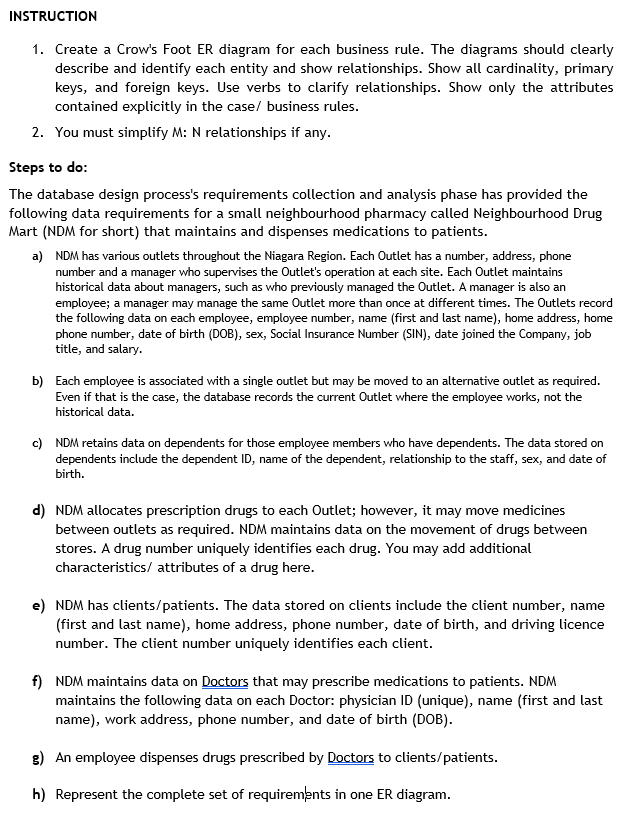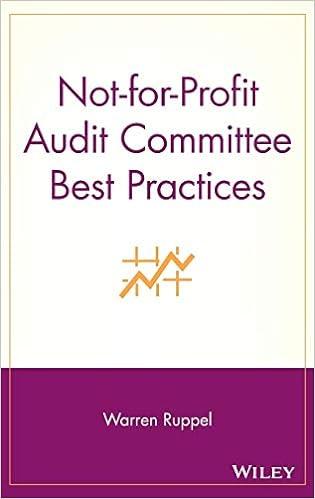Answered step by step
Verified Expert Solution
Question
1 Approved Answer
Please answer only multi-part question g) INSTRUCTION 1. Create a Crow's Foot ER diagram for each business rule. The diagrams should clearly describe and identify

Please answer only multi-part question g)
INSTRUCTION 1. Create a Crow's Foot ER diagram for each business rule. The diagrams should clearly describe and identify each entity and show relationships. Show all cardinality, primary keys, and foreign keys. Use verbs to clarify relationships. Show only the attributes contained explicitly in the case/ business rules. 2. You must simplify M:N relationships if any. Steps to do: The database design process's requirements collection and analysis phase has provided the following data requirements for a small neighbourhood pharmacy called Neighbourhood Drug Mart (NDM for short) that maintains and dispenses medications to patients. a) NDM has various outlets throughout the Niagara Region. Each Outlet has a number, address, phone number and a manager who supervises the Outlet's operation at each site. Each Outlet maintains historical data about managers, such as who previously managed the Outlet. A manager is also an employee; a manager may manage the same Outlet more than once at different times. The Outlets record the following data on each employee, employee number, name (first and last name), home address, home phone number, date of birth (DOB), sex, Social Insurance Number (SIN), date joined the Company, job title, and salary. b) Each employee is associated with a single outlet but may be moved to an alternative outlet as required. Even if that is the case, the database records the current Outlet where the employee works, not the historical data. c) NDM retains data on dependents for those employee members who have dependents. The data stored on dependents include the dependent ID, name of the dependent, relationship to the staff, sex, and date of birth. d) NDM allocates prescription drugs to each Outlet; however, it may move medicines between outlets as required. NDM maintains data on the movement of drugs between stores. A drug number uniquely identifies each drug. You may add additional characteristics/ attributes of a drug here. e) NDM has clients/patients. The data stored on clients include the client number, name (first and last name), home address, phone number, date of birth, and driving licence number. The client number uniquely identifies each client. f) NDM maintains data on Doctors that may prescribe medications to patients. NDM maintains the following data on each Doctor: physician ID (unique), name (first and last name), work address, phone number, and date of birth (DOB). g) An employee dispenses drugs prescribed by Doctors to clients/patients. h) Represent the complete set of requirements in one ER diagram. INSTRUCTION 1. Create a Crow's Foot ER diagram for each business rule. The diagrams should clearly describe and identify each entity and show relationships. Show all cardinality, primary keys, and foreign keys. Use verbs to clarify relationships. Show only the attributes contained explicitly in the case/ business rules. 2. You must simplify M:N relationships if any. Steps to do: The database design process's requirements collection and analysis phase has provided the following data requirements for a small neighbourhood pharmacy called Neighbourhood Drug Mart (NDM for short) that maintains and dispenses medications to patients. a) NDM has various outlets throughout the Niagara Region. Each Outlet has a number, address, phone number and a manager who supervises the Outlet's operation at each site. Each Outlet maintains historical data about managers, such as who previously managed the Outlet. A manager is also an employee; a manager may manage the same Outlet more than once at different times. The Outlets record the following data on each employee, employee number, name (first and last name), home address, home phone number, date of birth (DOB), sex, Social Insurance Number (SIN), date joined the Company, job title, and salary. b) Each employee is associated with a single outlet but may be moved to an alternative outlet as required. Even if that is the case, the database records the current Outlet where the employee works, not the historical data. c) NDM retains data on dependents for those employee members who have dependents. The data stored on dependents include the dependent ID, name of the dependent, relationship to the staff, sex, and date of birth. d) NDM allocates prescription drugs to each Outlet; however, it may move medicines between outlets as required. NDM maintains data on the movement of drugs between stores. A drug number uniquely identifies each drug. You may add additional characteristics/ attributes of a drug here. e) NDM has clients/patients. The data stored on clients include the client number, name (first and last name), home address, phone number, date of birth, and driving licence number. The client number uniquely identifies each client. f) NDM maintains data on Doctors that may prescribe medications to patients. NDM maintains the following data on each Doctor: physician ID (unique), name (first and last name), work address, phone number, and date of birth (DOB). g) An employee dispenses drugs prescribed by Doctors to clients/patients. h) Represent the complete set of requirements in one ER diagramStep by Step Solution
There are 3 Steps involved in it
Step: 1

Get Instant Access to Expert-Tailored Solutions
See step-by-step solutions with expert insights and AI powered tools for academic success
Step: 2

Step: 3

Ace Your Homework with AI
Get the answers you need in no time with our AI-driven, step-by-step assistance
Get Started


